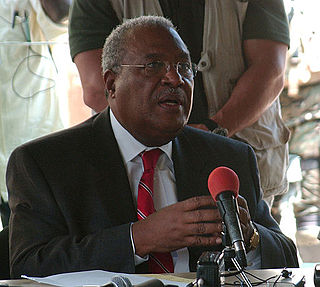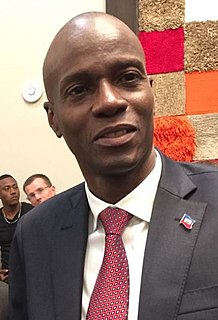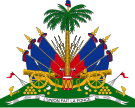
Jean-Bertrand Aristide is a former Haitian priest and politician who became Haiti's first democratically elected president. A proponent of liberation theology, Aristide was appointed to a Roman Catholic parish in Port-au-Prince in 1982 after completing his studies to become a priest of the Salesian order. He became a focal point for the pro-democracy movement first under Jean-Claude "Baby Doc" Duvalier and then under the military transition regime which followed. He won the Haitian general election between 1990 and 1991, with 67% of the vote and was briefly president of Haiti, until a September 1991 military coup. The coup regime collapsed in 1994 under U.S. pressure and threat of force. Aristide was then president again from 1994 to 1996 and from 2001 to 2004. However, Aristide was ousted in the 2004 coup d'état after right-wing ex-army paramilitaries invaded the country from across the Dominican border. As he claimed, the United States helped orchestrate the coup against him. Aristide was later forced into exile in the Central African Republic and South Africa. He finally returned to Haiti in 2011 after seven years in exile.

Gérard Latortue was the Prime Minister of Haïti from March 12, 2004 to June 9, 2006. He was an official in the United Nations for many years, and briefly served as foreign minister of Haïti during the short-lived 1988 administration of Leslie Manigat.

Elections in Haiti gives information on election and election results in Haiti.

The 2006 elections in Haiti, to replace the interim government of Gérard Latortue put in place after the 2004 Haiti rebellion, were delayed four times after having been originally scheduled for October and November 2005. The elections finally took place on February 7, 2006, with turnout of around 60%. All 99 seats in the Chamber of Deputies of Haiti and all 30 seats in the Senate of Haiti were also contested. Run-off elections for the Chamber of Deputies of Haiti were held on 21 April 2006, with around 28% turnout.

The Senate of the Parliament of the Czech Republic, usually referred to as Senate, is the upper chamber of the Parliament of the Czech Republic. The seat of the Senate is Wallenstein Palace in Prague.
Fwon Lespwa was a Haitian political coalition headed by René Préval, who served as president from 1996 to 2001 and from 2006 to 2011. The name Lespwa is the Haitian Creole form of the French l'espoir, meaning "hope". The coalition's full French name is Front de l'Espoir. Lespwa includes many members and former members of the last democratically elected government of Jean Bertrand Aristide and his Fanmi Lavalas.

The Struggling People's Organization, called until 1996 Lavalas Political Organization, is a Haitian political party originating from the Lavalas political movement. Formed in 1995, the more conservative Lavalas split from the party in 1996 forming their own Fanmi Lavalas party, at this time the OPL's name was changed from Organisation Politique Lavalas to its present appellation. This split meant that few of the intelligentsia that had previously supported Aristide ended up in the new Lavalas.

The Chamber of Deputies is the lower house of Haiti's bicameral legislature, the National Assembly. The upper house of the National Assembly is the Senate of Haiti. The Chamber has 119 members who are elected by popular vote to four-year terms. There are no term limits for Deputies; they may be re-elected indefinitely.

The Haitian Parliament is the bicameral legislature of the Republic of Haiti, consisting of the upper house as the Senate (Sénat) and the lower house as the Chamber of Deputies. Both assemblies conduct legislative sessions at the Haitian capital of Port-au-Prince.

The Senate is the upper house of Haiti's bicameral legislature, the National Assembly. The lower house of the National Assembly is the Chamber of Deputies. The Senate consists of thirty seats, with three members from each of the ten administrative departments. Prior to the creation of the department of Nippes in 2003, there were twenty-seven seats. Senators are elected by popular vote to six-year terms, with one-third elected every two years. There are no term limits for Senators; they may be re-elected indefinitely.

Senate elections for a third of the seats in the Senate of Haiti were held on 19 April 2009, with a run-off to be held on 21 June 2009. Per the Constitution of Haiti, voters should renew ten of the thirty seats in the Senate, but as Pierre Emmanuel Limage, died in a car accident and Ultimo Compère and Rudolph H. Boulos resigned, there will be twelve open seats instead.

General elections were held in Haiti on 28 November 2010, having originally been scheduled for 28 February. Ten senators and all 99 deputies were to be elected.
Convergence Démocratique was a Haitian political movement created in summer 2000 in opposition to Jean-Bertrand Aristide and his Fanmi Lavalas (FL) party. A group of disparate opposition parties and social organizations, it was crafted and built by the International Republican Institute. The Convergence Démocratique was backed by "the Haitian elite, the Bush administration, the Republicans in Congress, and especially the International Republican Institute ... The International Republican Institute did all it could to urge the DC to build a national electoral constituency that could rival Aristide’s FL party at the polls ..." The Convergence Démocratique "was elemental in provoking the ongoing tension and violence in the nation, eventually leading to the illegal and violent overthrow of President Aristide. IRI's role was beyond pivotal."
Leading figures in the Convergence Démocratique made no secret of their intentions at the time of Aristide’s reinauguration as president in February 2001; they openly called for another US invasion, ‘this time to get rid of Aristide and rebuild the disbanded Haitian army’. Failing that, they told the Washington Post, ‘the CIA should train and equip Haitian officers exiled in the neighbouring Dominican Republic so they could stage a comeback themselves’." With the CD's inability to develop sufficient public support among the Haitian poor, reaching just 8% in March 2002 opinion polls, the electoral route for CD was not promising.

Parliamentary elections were held in Haiti on 6 April 1997 for one third of the seats in the Senate and two in the Chamber of Deputies. A total of 45 candidates from 15 parties contested the Senate elections.

Presidential elections were held in Haiti on 25 October 2015, alongside local elections and the second round of the legislative elections. Incumbent President Michel Martelly was constitutionally barred from running. As no candidate received a majority of the vote in the first round, a runoff was to be held on 27 December 2015. Voter turnout was reportedly 28.8%. On 22 December the Conseil Electoral Provisoire announced that the runoff has been postponed indefinitely. However, on 1 January 2016 President Michel Martelly announced that the runoff would be held on 17 January, but on 7 January the President changed the date to 24 January. On 20 January, Jude Célestin issued a statement that calls "whatever the person who will participate in this January 24 [runoff], is a traitor to the Nation". Because of rioting and electoral violence, on 22 January the CEP decided to postpone the second round again, with no specific date given, even after President Michel Martelly confirmed the previous day in a nationwide speech that the election should still take place. The run-off date was later agreed to take place on 24 April 2016. However, according to Reuters and several other sources, the runoff is postponed again with an indeterminate date most likely after October 2016. United Nations Secretary-General has expressed deep concern that the agreed upon date for holding elections in Haiti was not met and that no alternate electoral calendar was announced.

Parliamentary elections were held in Haiti on 9 August 2015, with a second round planned initially on 25 October. Two-thirds of the Senate and all members of the Chamber of Deputies were up for election.

Brignol Lindor, was a Haitian radio journalist and news editor, lawyer and teacher. Lindor was a prominent voice in politics, speaking mostly on behalf of the Democratic interests of the Haitian people. His brutal murder was blamed on threats from leftist politicians who supported President Jean-Bertrand Aristide.

Presidential elections were held in Haiti on 20 November 2016, after having been postponed several times.

Senate elections were held in Haiti with a first round on 20 November 2016, and a second on 29 January 2017. The first round were held simultaneously with the presidential elections and the second round of the parliamentary elections that still had a run-off pending in some constituencies since 2015.












